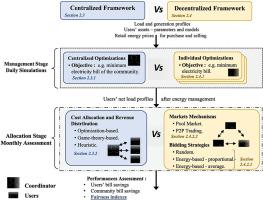能源社区的公平性:集中式和分散式框架
IF 16.3
1区 工程技术
Q1 ENERGY & FUELS
引用次数: 0
摘要
这项研究讨论了能源社区的公平性,同时调查了两种类型的运营和成本分担组织。一方面,集中式架构由中央控制器协调运营社区资产,然后由社区管理者在用户之间分享整体利益。在每月的交付后阶段,研究并实施了四种共享策略。相比之下,在分散式架构中,每个用户都独立运营其资产。在这种框架中,成本/收益通常通过基于市场的机制在用户之间共享,这种机制依赖于用户的出价。这项工作随后探讨了池市场和点对点交易,从用户的角度研究了不同出价的影响。最后,根据用户和社区层面的经济表现,对所有提议的集中式和分散式方法(共 10 种)进行了评估。其中特别关注了社区内的公平性,这一点具有挑战性。然后考虑了从经济学和博弈论中得出的三个指标,以及为能源社区量身定制的指标。一个七人用户社区的研究结果表明,与点对点市场相比,分散式框架中的池市场系统性地节省了大量成本。更重要的是,与分散式框架相比,集中式框架系统性地带来了最显著的账单减少(16%)和更公平的成本分配。本文章由计算机程序翻译,如有差异,请以英文原文为准。

Fairness in energy communities: Centralized and decentralized frameworks
This research discusses fairness in energy communities while investigating two types of organizations for operation and cost-sharing. On the one hand, centralized architectures consist of operating community assets in a coordinated manner with a central controller before a community manager shares the overall benefits between the users. Four sharing strategies are investigated and implemented in a monthly post-delivery phase. In contrast, in decentralized architectures, each user operates its assets independently. In such frameworks, the costs/benefits are usually shared among users through market-based mechanisms that rely on users' bids. This work then explores the Pool market and Peer-to-peer transactions to investigate the impact of different bidding from the users' perspective. Ultimately, all the proposed centralized and decentralized approaches (10 in total) are assessed based on economic performances at both users' and community levels. Specific attention is paid to fairness within the community, which is challenging. Three indexes derived from economy and game theory are then considered, along with metrics tailored for energy communities. Results from a seven-user community indicate that the pool market systematically returns considerable savings among decentralized frameworks compared to peer-to-peer markets. More importantly, centralized frameworks systematically yield the most significant bill reduction (16 %) and fairer cost allocation compared to decentralized frameworks.
求助全文
通过发布文献求助,成功后即可免费获取论文全文。
去求助
来源期刊

Renewable and Sustainable Energy Reviews
工程技术-能源与燃料
CiteScore
31.20
自引率
5.70%
发文量
1055
审稿时长
62 days
期刊介绍:
The mission of Renewable and Sustainable Energy Reviews is to disseminate the most compelling and pertinent critical insights in renewable and sustainable energy, fostering collaboration among the research community, private sector, and policy and decision makers. The journal aims to exchange challenges, solutions, innovative concepts, and technologies, contributing to sustainable development, the transition to a low-carbon future, and the attainment of emissions targets outlined by the United Nations Framework Convention on Climate Change.
Renewable and Sustainable Energy Reviews publishes a diverse range of content, including review papers, original research, case studies, and analyses of new technologies, all featuring a substantial review component such as critique, comparison, or analysis. Introducing a distinctive paper type, Expert Insights, the journal presents commissioned mini-reviews authored by field leaders, addressing topics of significant interest. Case studies undergo consideration only if they showcase the work's applicability to other regions or contribute valuable insights to the broader field of renewable and sustainable energy. Notably, a bibliographic or literature review lacking critical analysis is deemed unsuitable for publication.
 求助内容:
求助内容: 应助结果提醒方式:
应助结果提醒方式:


